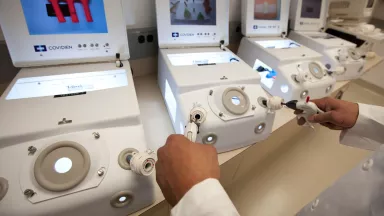Orthopedic Trauma: General Questions
We treat a wide range of injuries, including fractures of the upper extremity, lower extremity, pelvis and acetabulum. Additionally, we manage periprosthetic fractures as well as injuries of the quadriceps, patellar and Achilles tendons.
You can request a visit through our website or by calling us at 718-920-2060. Please indicate if you have been treated in an emergency room, have been diagnosed with a fracture or believe you need surgery.
Not all fractures require treatment by a trauma surgeon. Some fractures—such as those of the hand, foot and spine—are best managed by upper extremity, foot and ankle, and spine specialists, respectively. Specialists within the department work collaboratively. If it is determined that a different specialist is better suited to manage your injury, we will facilitate an appointment and coordinate your care.
Yes. If your fracture has failed to heal (nonunion), has healed in an angulated alignment (malunion) or has resulted in painful hardware, limb-length inequality or a bone infection, we can assess you and provide treatment options.
We routinely accept transfers from other facilities and are prepared to take care of you at Montefiore Einstein. We try to make the transfer process as easy as possible. Please contact the Orthopedic Transfer Hotline at 718-920-2800 to begin the transfer process.
Generally, your first appointment with the surgeon will involve an evaluation that takes into account your medical history, current symptoms and an examination of the injured area. If X-rays are required, they can be taken the same day. In some cases, additional tests will be recommended, and once authorized, can be scheduled for a later date.
Any relevant medical information, including diagnostic reports and images, will help us better evaluate your condition. If you have these available as digital files, please bring them with you to your first visit.
Additionally, please bring the following:
- Insurance card
- Photo ID
- Outside medical records
- Outside slides with pathology reports
- Referring physician contact information
- Primary care provider contact information
- Pharmacy contact information
Please plan to arrive at least 15 minutes before your scheduled appointment to allow for the registration and insurance verification process. We understand staying on schedule is important to our patients, and your early arrival helps ensure we can see all our patients in the timeliest manner possible.
Insurance policies differ from patient to patient, and coverage will depend on both the procedure and your individual policy. The surgeon's office will always obtain authorization in advance of any surgical procedure; however, we advise you to speak with your insurance representative to discuss patient responsibility, co-pays and other important coverage details.
If changes to your insurance coverage are due to occur before or near the date of your surgery, please notify us immediately. Authorization, which can take time, may need to be obtained from your new insurance company. Failure to inform us of these changes could result in the cancellation or postponement of your surgery.
Yes. Generally, there are a number of individuals who can assist you with forms and paperwork. Often, it is best to bring these materials to your surgeon’s office before surgery. Please consult your surgeon for specific instructions.
Orthopedic Trauma: Preparing for Your Surgery
Surgery is an invasive procedure that carries inherent risk. Prior to obtaining your written consent, your surgeon will discuss the surgery's risks, benefits and alternatives. Any risks related to anesthesia will be addressed by a member of the anesthesia team. Please speak with your surgeon or a member of their team if additional clarification is necessary.
Preparing for surgery is, to some extent, personalized and will depend on the procedure being performed, as well as your medical condition. Some patients will need to obtain medical clearance from their primary care provider prior to surgery. On occasion, additional clearance from relevant specialists will be required to ensure patient safety. Preoperative testing—like blood work, electrocardiograms (EKGs), urine tests and chest X-rays—may also be necessary. Your surgeon or a member of their team will explain everything that’s necessary in advance of surgery.
Please do not eat or drink after midnight on the evening before your surgery. Consuming food or liquids prior to anesthesia can be dangerous and, for safety reasons, may result in the postponement or cancellation of your procedure. If you have been instructed to take certain home medications on the morning of surgery, it is safe to do so with a sip of water. Pediatric patients may be allowed to have clear liquids, such as water, up to three hours prior to surgery. Milk and other non-clear liquids cannot be consumed after midnight on the evening before surgery. Please speak with your surgeon or a member of their team if additional clarification is necessary.
It depends. There are medications that need to be continued the morning of surgery and there are medications that must be discontinued. Prior to surgery, our nurses will advise which medications you should or should not take before your procedure. Please speak with your surgeon or a member of their team if additional clarification is necessary.
If you have digital files of your preoperative imaging, please bring them with you on the day of surgery. In addition, it is helpful to bring a list of medications you are currently taking. We also recommend you bring something to read or occupy yourself with while you wait. For your own safety, we require that a friend or family member accompany you home following the surgery.
Yes. Please leave any jewelry, watches or other valuables at home for safekeeping. Although cell phones and clothing are stored in locked storage during surgery, we strongly recommend against bringing valuables and other non-essentials with you.
Montefiore Einstein has three main surgical sites. The Wakefield Campus serves as our main trauma facility and is located at 600 East 233rd St., Bronx, NY 10466. In some instances, your care will be provided at one of our other surgical sites. Prior to surgery, your surgeon's office will provide you with specific instructions on where to go and when to arrive.
Generally, patients are required to check in one-and-a-half to two hours prior to surgery. The night before surgery, our staff will call to inform you what time to arrive. If surgery is scheduled for a Monday, you will be contacted the Friday before surgery. If surgery is scheduled following a national holiday, you will be contacted on the last day the hospital is open before your surgery. If you do not receive a call by 4:00 p.m. on that day, you should contact your surgeon’s office or the Ambulatory Care Registration at 929-263-3477, as directed.
Orthopedic Trauma: After Your Surgery
The length of stay varies from patient to patient, depending on the individual and the nature of their injury. To some extent, this depends on when they are medically optimized for surgery and if they require additional post-operative monitoring. On average, patients are in the hospital for three to four days following hip fracture surgery.
A hip fracture is a substantial injury, and recovery can sometimes be challenging. The majority of patients regain their ability to walk, but will often require an assistive device, such as a cane or walker. Functional outcomes vary from patient to patient, depending on the individual and the nature of their injury. Please speak with your surgeon or a member of their team for additional information.
Pain medication is often helpful following surgery but is not always necessary. If medication is required, your surgeon will provide you with a prescription. As most prescriptions are electronically submitted directly to the pharmacy, you will be asked to provide your pharmacy’s contact information in advance.
Blood thinners, available in both injection and pill form, are frequently prescribed to help prevent blood clots. Vitamin D, calcium and other bond-building medications are also often recommended to prevent future fractures. We try to limit the use of narcotics, but, if necessary, they may be prescribed short-term following surgery. In such cases, we also recommend taking stool softeners to alleviate constipation, a frequent side effect of narcotics. We always recommend tapering and discontinuing the use of narcotics as soon as possible.
Post-operative care varies from patient to patient, and specific instructions depend on the procedure performed as well as other variables. Generally, showers are permitted in the early post-operative period, but your surgeon will likely instruct you to keep the wound clean and dry. Please speak with your surgeon or a member of their team if additional clarification is necessary.
Patients are often discharged to a rehabilitation center following hip fracture surgery. Discharge planning takes into account individual needs, physical therapy goals and other patient-specific conditions. There are a number of individuals involved in helping to determine if you will benefit from admission to a rehabilitation center, including physical therapists, social workers and nurses. They will speak with you during your admission and provide you with additional information, as it becomes available.
Post-operative care and follow-up visits vary from patient to patient and depend on the procedure performed, as well as other variables. Your post-operative appointment will be arranged either prior to surgery or upon discharge. Please speak with your surgeon or a member of their team if additional clarification is necessary.
Follow-up appointments depend on the nature of your condition and the treatment provided. Please consult your surgeon for more specific details.
Doctors are not able to clear patients for driving. This is a decision that must be made by patients when they feel safe and capable. Driving while using narcotic medications, such as prescription pain medication, is dangerous and should not be attempted under any circumstance. Additionally, we recommend that patients refrain from driving if they are experiencing any substantial discomfort that could contribute to or result in an accident. While there is no specific law against driving with a dressing or a cast, we strongly discourage it. Your safety and the safety of others are of paramount importance.
Return to work varies from patient to patient and depends on a host of patient-specific factors, including the type of work you do and the type of surgery you are having.
Physician Referrals
Montefiore Einstein embraces a collaborative approach.
If you have a patient who could benefit from our services, please reach out.
718-920-2060
Schedule a Visit
Have a general question or concern?
We’re available to help you by phone or email.
• 718-920-2060 • orthofeedback@montefiore.org






